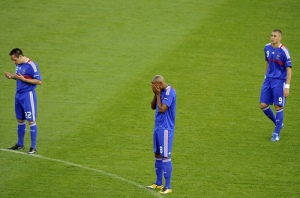Ergo Cogito Sum – I think therefore I am.
Is that really true? Yes, at the very least, there is an “I” who is doing the thinking. But am I in charge of my experiences or can others actually influence how I feel? Most of us would hate to think that we could be tools in the hands of others, but there is evidence to the contrary. In this blog I look at what insights neuroscience provides us, into our religious experiences (neurotheology) and brand loyalty (neuromarketing). These insights make one sit up and take notice of the way we live, love, work, and value our life’s experiences.
Visions and a feeling of being in the presence of the divine is hardly a historical phenomenon. People seem to have divine encounters all the time – these may be in the form of visions, the feeling of a divine presence and many a times one of sheer terror. Some of the existing experiences have been explained away as altered states of consciousness induced by trauma, sensory deprivation, fasting, chemical imbalances caused by various hallucinatory drugs and so on. A very interesting scientist, Michael Persinger, is looking at a new way of inducing the divine experience. He has developed a ‘God Helmet’ – a device that alters the electromagnetic field around your temporal lobes thus letting you experience the divine.
Persinger’s lab is in Sudbury – a mining town in Canada where he is said to have fled to from the US to escape the draft. The “epilepsy of the temporal lobes”, unlike other kinds of epilepsy, does not manifest in normal seizures like falling down unconscious – the surfers of temporal lobes epilepsy experience the divine. During their seizures they report closeness to God, being in God’s presence and even report having conversations with God. Persinger developed the God Helmet (a yellow crash helmet with electromagnets in it) to take a normal person without these experiences & to induce this electrical activity and get visions of God or whatever else there could be. The subjects are tested via a battery of tests to ensure that they are “normal” and then led into a sound proof dark room that ensures complete sensory deprivation. The helmet is strapped on and the subject is left alone. The electromagnetic field is then manipulated. Most people experience a religious moment. Then there are others like Richard Dawkins who experienced nothing – just some discomfort, and Lone Frank (a neuroscience journalist, confirmed atheist and author of Mindfield) who experienced Gollum around her feet. Why does this happen? In the absence of the any sensory stimulation the two halves of the brain try and make sense of changing stimuli from the electromagnetic field. Both halves of the brain have their own identity and sense each other’s presence. It then tries to make sense of this. Those with religious beliefs sense a divine presence or fear and evil, whereas the atheists sense discomfort and at times even Gollum. Thus it appears that our worldview and socialisation mostly determine what we experience.
This search for defining ourselves leads us to the Pepsi Paradox. Marketeers have been puzzled by this – in the taste tests Pepsi always outperforms Coke but then why does Coke sell more? There have been various explanations for this for e.g. “satiety level”, Pepsi being sweeter tastes better in small amounts, where as Coke tastes better over the course of the whole drink. In 2004, neuroscientist McClure and his colleagues, put willing subjects into the fMRI machines and gave them Coke and Pepsi to taste. In the first set of experiments they were not told whether they were getting Coke or Pepsi.

Cola Wars: Pepsi hurt by Coke
In the case of Pepsi the reward centres for pleasure lit up a lot more – evidence that at a sensory level people preferred Pepsi more. During the second tests the subjects were told what they drinking. A strange thing happened. First, the primary reward area of the brain lit up, and moments later the ventromedial prefrontal cortex (VMPC) lit up and people changed their response to say – that they liked coke better. This was the first insight into how we define ourselves in light of our experiences. A later study in 2007 by Michael Koenigs and Daniel Tranel found that People with damaged VMPC were brand blind.
It appears that while we can think – we are open, very wide open, to suggestions. Our brain is continuously influenced by the cultural messages it receives, these messages are so strong that they override our primary responses and preferences. These messages are processed in our VMPC influencing how we establish our sense of self, identify with religion, understand and relate to God, build political allegiances, choose our football team, and become loyal to a brand. This has profound implications across the entire spectrum of the Human Condition- our behaviour, relationships and social institutions. What should we watch, read and play? How should we access, interpret and use information? How should we educate our children? How do we choose our friends? ….
I’ll be blogging about new ways of thinking about all these aspects in my coming blogs




You must be logged in to post a comment.